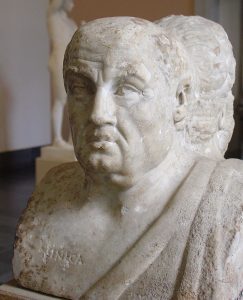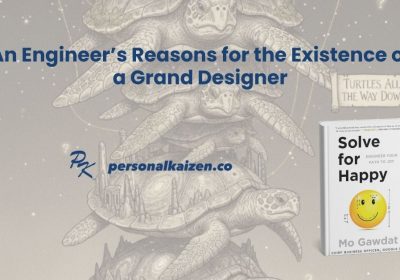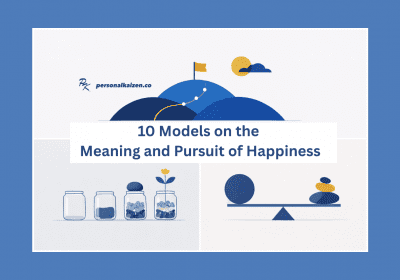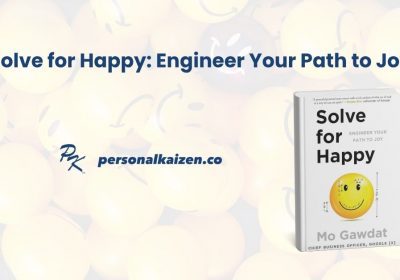We have recently studied works of Stoic philosophy that we believe can be inspiring to our followers. We have shared 5 Ways Stoic Philosophy Improves your Mood and Attitude, and some simple Meditations from Marcus Aurelius. This week we highlight Stoic teachings from a letter by the Roman Seneca titled, On the Shortness of Life.

Photo Credit: wikipedia.com
Lucius Seneca (often referred to as Seneca the Younger) was raised in Rome 2,000 years ago. His father (Seneca the Elder) was a Senator and had Seneca the Younger trained in philosophy. Seneca became a powerful man when the student he tutored, Nero, became the emperor of Rome in 54 AD. He was forced to take his own life in AD 65 after an assassination attempt on Nero in which Seneca was likely innocent. There are numerous paintings of his calm, stoic suicide.
Seneca penned 8-10 tragic plays and wrote several philosophical essays. His most popular Stoic writings consist of 124 letters dealing with moral issues. The letter we are sharing quotes from in this post, De Brevitate Vitæ, was addressed to his father-in-law Paulinus. The entire letter will take 25-30 minutes to read and you can find it here. We share our favorite inspiring passages from On the Shortness of Life by Seneca with a bit of commentary below.
On the Shortness of Life by Seneca
It is not that we have a short space of time, but that we waste much of it. Life is long enough, and it has been given in sufficiently generous measure to allow the accomplishment of the very greatest things if the whole of it is well invested.
It always bugs me to hear people say, “I didn’t have time to do that.”
We all have the same amount of time in our lives, and plenty of time to get things done. What people should explain instead is, “I didn’t prioritize that task highly enough to get it done.”
Seneca encourages us to prioritize the greatest things rather than wasting our time.
“The part of life we really live is small.” For all the rest of existence is not life, but merely time.

Here are a few suggestions for living your life to its fullest:
- Use your natural strengths and find work you are good at and truly enjoy.
- Live in the moment and truly enjoy the time you spend on mundane tasks like eating, cleaning, playing with your kids, etc.
- Add more value to your “waste time.” For example, talk with friends or listen to a great book on your commute. Listen to a great podcast while waiting in line.
In guarding their fortune men are often closefisted, yet, when it comes to the matter of wasting time, in the case of the one thing in which it is right to be miserly, they show themselves most prodigal. And so I should like to lay hold upon someone from the company of older men and say: “I see that you have reached the farthest limit of human life, you are pressing hard upon your hundredth year, or are even beyond it; come now, recall your life and make a reckoning. Consider how much of your time was taken up with a moneylender, how much with a mistress, how much with a patron, how much with a client, how much in wrangling with your wife, how much in punishing your slaves, how much in rushing about the city on social duties. Add the diseases which we have caused by our own acts, add, too, the time that has lain idle and unused; you will see that you have fewer years to your credit than you count.
Consider this:
- Most of us spend a full one-third of our life sleeping!
- Many of us spend 45 (or more) hours per week working or commuting to work. This is another 40% of our awake time.
- Daily tasks like eating, cleaning, shopping, bathing, dressing, and can easily consume another 3-5 hours per day (only leaving 30-40 hours per week for everything else)
How much of the rest of your time do you waste and not really enjoy? Seneca wants us to not regret this wasted time.
You will hear many men saying: “After my fiftieth year I shall retire into leisure, my sixtieth year shall release me from public duties.” And what guarantee, pray, have you that your life will last longer? Who will suffer your course to be just as you plan it? Are you not ashamed to reserve for yourself only the remnant of life, and to set apart for wisdom only that time which cannot be devoted to any business? How late it is to begin to live just when we must cease to live! What foolish forgetfulness of mortality to postpone wholesome plans to the fiftieth and sixtieth year, and to intend to begin life at a point to which few have attained!

Early in my consulting career, I worked closely with a COO on healthcare improvements. This wonderful man did not retire for several years. A few months after retirement, he lost his life in a tragic accident. We had discussed his plans for retirement and now he was unable to accomplish any of them.
The lesson here is simple – do not wait to live your life until you retire. If you haven’t already, create a bucket list. Then identify items from the list you can work on immediately – this year – so you enjoy your life now in the present.
Finally, everybody agrees that no one pursuit can be successfully followed by a man who is preoccupied with many things—eloquence cannot, nor the liberal studies—since the mind, when distracted, takes in nothing very deeply, but rejects everything that is, as it were, crammed into it. There is nothing the busy man is less busied with than living: there is nothing that is harder to learn.
This passage reminds me of an old joke. I did some research and found a few versions on the internet I have edited to share with you.
A businessman was standing at the end of the pier in a small coastal Mexican village when a small boat with a fisherman docked. Inside the small boat were several large fish. The businessman complimented the fisherman on the catch and asked how long it took.

The fisherman replied that it only took a little while. The businessman then asked why didn’t he stay out longer and catch more fish. The fisherman said he had enough to support his family’s immediate needs.
The businessman then asked: “But what do you do with the rest of your time?”
The fisherman said: “I sleep late, fish a little, play with my children, take a siesta with my wife, stroll into the village each evening where I sip wine and play guitar with my friends. I have a full and busy life.”
The businessman scoffed. “I am an MBA and could help you. You should spend more time fishing and with the proceeds buy a bigger boat and eventually have a fleet of fishing boats. Instead of selling your catch to a middleman, you would sell directly to the processor, and eventually control the product, processing, and distribution. You would need to leave this small coastal fishing village and move to Mexico City, then LA, and eventually NYC to run your expanding enterprise.”
The fisherman asked: “But how long will this all take?”
“Fifteen or twenty years.”
“But what then?”
The businessman laughed and said: “That’s the best part. When the time is right you would sell your company stock to the public and become very rich, you would make millions.”
“Millions? Then what?”
The businessman said: “Then you would retire. Move to a small coastal fishing village where you would sleep late, fish a little, play with your kids, take a siesta with your wife, and stroll to the village in the evenings where you could sip wine and play your guitar with your friends!”
The lesson in this joke? Begin with the end in mind.
He will have friends from whom he may seek counsel on matters great and small, whom he may consult every day about himself, from whom he may hear truth without insult, praise without flattery, and after whose likeness he may fashion himself.
This is another idea for action from the Personal Kaizen 10 Rules for Life. We tend to become most like the people we spend time with. Make sure these people are living their best life and helping you to lead yours.
They lose the day in expectation of the night, and the night in fear of the dawn.
Seneca offers another Stoic reminder to live in the present and be proactive. What you do is more important than your philosophy. Actions speak louder than words.
Reasons for anxiety will never be lacking, whether born of prosperity or of wretchedness; life pushes on in a succession of engrossments. We shall always pray for leisure, but never enjoy it.

Seneca wrote, “reasons for anxiety will never be lacking . . . in a succession of engrossments.” nearly 2,000 years ago. Can you imagine what he would think today as we each carry around supercomputers in our pocket that are either full of distractions or constantly telling us all the issues with the world?
Be sure to disconnect from your phones and other screens every day. It will surely contribute to a decrease in anxiety.
The condition of all who are preoccupied is wretched, but most wretched is the condition of those who labor at preoccupations that are not even their own, who regulate their sleep by that of another, their walk by the pace of another, who are under orders in case of the freest things in the world—loving and hating. If these wish to know how short their life is, let them reflect how small a part of it is their own.
Live the life you deserve, with your goals and values. The only way to do this is to take the time to think for yourself about what you value. What do you want your life to be? Then use personal kaizen to become the person you want to be.
We hope these Stoic thoughts from On the Shortness of Life by Seneca were inspiring to you. We share Stoic principles from another great thinker in our next post.




